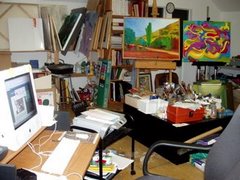
Back Standing L-R: Cousins Shahriar and Tus; Front Seated L-R: Mom, my Cousin Nanaz, me, my mother's sister and Shahriar's mother Aunt Fakhri. How are we related? Well, the two ladies in white shirts are sisters. The rest of us are children of those two and children of a brother and a sister who have passed away. Nanaz's father and Tus's mother are deceased, Shahriar is Aunt Fakhri's son, and if you are reading my blog, you better know who my mother is!
I love this side of my family very much. There are now sixteen cousins and some of us have chosen to live our adult years in Europe and North America. No matter how much time goes by before there is an opportunity for us to get together, we still just pick up from where we left off each and every time. Growing up, my sisters and I felt left out from our family in Iran. This was due to my father's job. We would live in a country for two to four years, and then move back to Iran for a year or two. During this time, we would usually live at my grandmother's house where Aunt Fakhri lived with Shahriar and his younger brother, Shahrokh. These two cousins were like brothers to my sisters and me and they still are like brothers to us. Regardless of how long we stayed away, and still stay away, when we are together it is as if we never lost any time. That's why I always feel very close to Mom's side of the family. Uncle Mohsen and his family lived in Iran for four, maybe five years in the 1960's. Our cousins Eugene, Ashley, and Rachelle live in the USA. When they get together with the rest of the family, it is the same way.

My Mother and her sister, Fakhri.
Today would have been an easy day if I hadn't stayed up all night reading Khaled Hosseini's new novel: "A Thousand Splendid Suns". It's another good book, full of angst and set in Afghanistan. I finished the book, but ended up sleeping for three hours in the morning. I was a bit sleepy when Mom and I went to lunch at Mr. & Mrs. Kia's house which is only two buildings down from ours. Mr. & Mrs. Kia are parents of my friends from high school. Mr. Kia was my father's colleague also, so they entertained with my parents in those days gone by. By the time my cousin Nanzanin (AKA Nanaz) came to pick me up in the afternoon, I was feeling better. Nanaz and I went to two goldsmiths and looked at some very nice Iranian style jewelry. Then we headed to Aunt Fakhri's for dinner. Our cousins, Tus and Shahriar, and my Mom were already there when we arrived.

My cousin Shahriar whose mother is Aunt Fakhri, my Mother's sister.

My cousin Tus, whose mother was Aunt Derakhi, my Mother's sister.
Nice, easy day. I have much work to do tomorrow. I have to start translating the interviews so that I can add fresh information from my memory before I loose it. I also have to plan a trip to Zanjan and a trip to Sanandaj. Most of my work in Tehran, however, is done.




